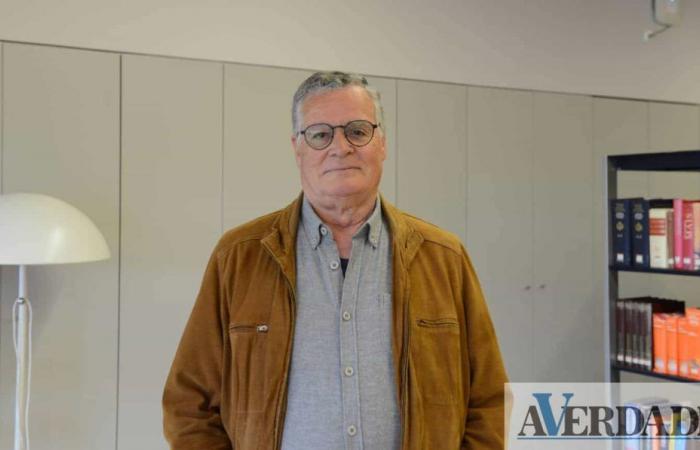Advertising
The 50th anniversary of the 25th of April and the 80th anniversary of the “Bread Revolt” are celebrated in Marco de Canaveses: “it is important that the Marcoenses are proud of this fact and celebrate it”.
Clemente Alves, born in the village of Magueija, in Lamego, but living in Lisbon/Cascais all his active life, joined an investigation into the city of Marco de Canaveses at the invitation of Fátima Vale, poet and artist, and Isabel Baldaia, president of the GRUTA CCL Association – Teatro da Livração, and teacher. As a former political prisoner and member of URAP (União de Resistências Antifascistas Portugueses), Clemente Alves was challenged to collect information about political prisoners in the municipality. The information they collected was “surprising”as they discovered that 175 people were arrested in Marco de Canaveses during the dictatorship, of which 23 on the same day. “We found it very strange”, highlighted Clemente Alves and Fátima Vale. Their research led them to discover an act of resistance in this municipality, which they called “The Bread Revolt”.
On June 13, 1944, an attack was triggered in Marco de Canaveses. “revolt with many hundreds of people, perhaps thousands… The documents show a crowd that filled the square of the city hall”. But why the bread revolt? Clemente Alves and Fátima Vale tell the readers of Jornal A TRUTH. “The first measure implemented by the Salazar regime forced cereal producers, especially corn and wheat, to hand them over to the State, in exchange they lifted flour rationing and were left with seeds to produce the following year. The regime, not satisfied with this drastic measure that led to hunger in many families, decided to impose on the population the collection of bread already made in some authorized bakeries, instead of flour. This had a huge impact on families, because with one kilo of flour people can multiply and make more bread, adding other components, namely potato starch. It’s poor quality bread, but it’s filling, if they provide the final product, families would be more cramped, this generated a huge uprising”describe adding that “on the day we went to get bread for the first time, a crowd gathered and the bells rang in the villages, including the bell of the Marco de Canaveses Volunteer Firefighters. The people were angry.”
Fátima Vale also explains that there was a Local Commerce Regulatory Commission, whose head was José Lobo, son of the mayor and notary, Mário Alexandre Rebelo Monteiro Lobo. This was “who knows how he knew” of the change that would occur with rationing, information was passed on that the FNPT, the National Bread Institute, would come on June 13th.
That same day the revolt took place: women from the paper factory, 200 workers who worked on a project at Ponte de Sobretâmega and hundreds of workers from other small projects and companies joined in. Together, they marched on the town and gathered in Largo da Feira and in front of the town hall, where they were confronted by security forces. “Disagreements were created. A baker, called by the mayor, tried to convince the crowd that the bread he made was better than flour. He was persecuted, he escaped being lynched, according to the words of the report written by the investigator of the Military Court of Lisbon to the honorable judge of the district of Marco de Canaveses, because he hid in a house”.
After the revolt ended, the president reported to the police the people who were “more active” in the process. “They all ended up being arrested, interrogated, subjected to violent procedures to confess their participation in the revolt and were condemned”.
Without going into further detail, Clemente Alves highlighted two particularities: “First, all this started with the women of Marco de Canaveses. They were the ones who gave rise to this revolt, because they were the mothers and the ones responsible for putting food on the table, they are the guardians of the family, they guard the future and they need to feed their children; second, Portugal fed the Nazi army. Our country has a deficit in cereal production. However, the regime understood that it would be a good opportunity to fill the coffers, the so-called ‘Salazar’s Gold’. We exported cereals that Portugal did not have to feed its own population. It was taking people who were already starving to sell ‘Portugal’s leftovers’ to the Germans. It was Portugal, in large part, that fed the Hitlerian army.”
The “Bread Revolt” was discussed for the first time at Marco de Canaveses Secondary School
Clemente Alves and Fátima Vale reported the events of the revolt, for the first time, at Escola Secundária do Marco de Canaveses, on March 1st. For Clemente Alves, it is at school that “It must begin to create the need in people to preserve memory. A people without memory makes the same mistakes. History is cyclical. It makes sense that this is talked about every day, young people, parents and grandparents should be proud that, 80 years ago, their ancestors had the courage to show the regime that that was not the way. The path must be one of development and freedom, which allows people to fulfill their desires”.
Clemente Alves was arrested at age 20 and one day before getting married
At the time when Clemente Alves was young, topics were not debated and opinions and ideas were not put on the table. Only the most daring reflected, individually, on the regime in which they grew up. This Portuguese was one of them. From the age of 15, Clemente Alves knew he had only one destiny: the Colonial War. This war I didn’t understand… “the horizon for a young boy was war, especially in Angola, Guinea and Mozambique. Active wars, where Portugal spent 50% of its budget to maintain them. I’m going to war and what war is this? He didn’t understand why he had to go to Africa to fight. If I’m bad here, they must be much worse there, because they took up arms.”remembers his thoughts in the prime of his life.
The doubts that arose daily in Clemente Alves’ consciousness were also fueled within the Catholic action group to which he belonged. “We had a habit of discussing problems related to the world of work, young people and the colonial war”. The whys never stopped arising and the reasons and solutions seemed to not exist. Clemente Alves’ boldness ended up being noticed by the only organized political force at the time: the PCP (Portuguese Communist Party), which lived underground and had existed since 1921.
The PCP’s mission was “raise awareness” the community and create a “organized force”. Although Clemente Alves longed to stand up to the oppressive regime, he confesses that he had several “reservations” in relation to the “communists”but the fact that they are “Against War” and defenders of “freedom” were reasons enough to join the party. He accepted, but knew that “sooner or later”the political police would find him.
It was at the age of 20 and one day before getting married that Clemente Alves was handcuffed and taken to Forte de Caxias, where he received treatment “violent. As soon as I arrived at the office, they called me to the office, when I entered, two police officers handcuffed me in front of the director who was very surprised, because they had said they just wanted to talk to me, they took me to Forte de Caxias, where they interrogated me. violent, with punches and kicks, I went through the torture of sleep… those were difficult times”recalls the former political prisoner.
The audacious man was sentenced, by the Plenary Court of Lisbon, to 14 months in prison, which he served between Forte de Caxias and Peniche, in conditions “very hard”. He ended up joining the military service and was arrested again and, this time, sent to a military disciplinary company in Penamacor, where he remained for months until he decided to desert. He moved to France and ended up celebrating April 25th in Paris.
“My April 25th was in Paris. It was the happiest day of my life.”
Abroad, the Portuguese were seen as ‘cochons’, that is, the “pigs” in French. “Paris was the second city in the world with the largest number of Portuguese people, around 300 thousand, but before the 25th of April, only those who were very attentive noticed the Portuguese… in the morning we saw crowds of our physical stature, which was underdeveloped, small people, thin and with their heads down, heading for low-skilled jobs. We looked like flocks of crows, Portuguese was not spoken and for the French we were just ‘cochons’, because we lived in slums, with horrible conditions, open sewers, it rained inside the houses, we smelled bad and accepted any job ”.
On April 25, 1974 everything changed. The ‘crows’ spoke Portuguese again and hugged each other as if it were the happiest day of their lives, at least for Clemente Alves it was. “Paris was a party. It was the happiest day of my life.”
At 72 years old, Clemente Alves continues to worry about “social differences. This reality shocks me. I fight for a more just society, with education for all, the right to health, freedom, culture, we need to feed our body with solid food and our spirit with ideas… discussing, reading, going to the cinema, the theater… it is fundamental for May our life have quality”remembering that anyone who works must have “a dignified life”it ended.






